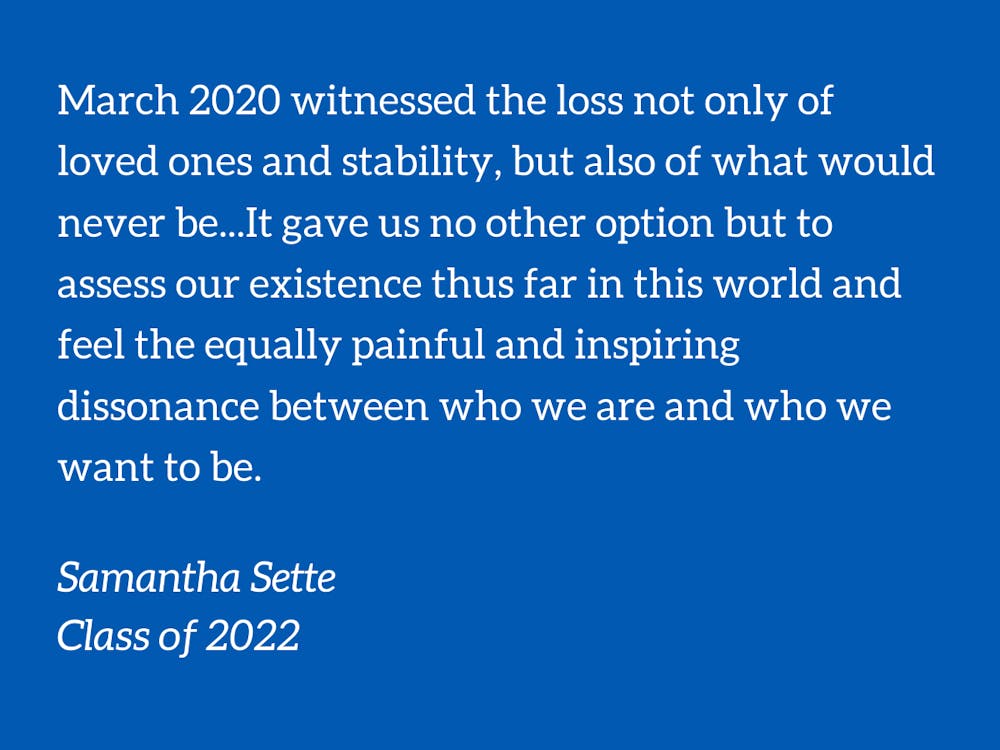**Content warning: references to mental illness and suicide.
The past few weeks felt all too familiar. It’s finally warm enough in Durham to pop off in a floral mini dress, eat lunch or read a book on the BC plaza and get a sexy tank top tan (read: burn) in Kville for the Duke vs. UNC game—all with spring break’s promise of restoration on the horizon.
It brings me back to this time two years ago, when things were good enough on campus to alleviate the weight of whatever bad grade or personal hardship we carried on our shoulders. Some of us thrived when Duke held an 8 point lead at halftime. Some of us pretended to thrive in the congested bleachers of Cameron when “Everytime We Touch” blared during a timeout. And some of us watched from the sidelines in silence as others lived out the college experience we wished we had.
None of us, however, expected a global pandemic to leave our campus barren with all of its hidden struggles exposed. Because the truth is, at no given point were we all really thriving. And it took a period of profound loss to prove it.
March 2020 witnessed the loss not only of loved ones and stability, but also of what would never be. It was a time of political tension, unscathed uncertainty and emotional burnout. It made us confront mortality at large as well as the fragility of our individual lives. It made us look inward for a strength that could no longer be obtained from the proximity of others. It gave us no other option but to assess our existence thus far in this world and feel the equally painful and inspiring dissonance between who we are and who we want to be.
In a cynical way, the pandemic was a gift we didn’t know we needed: unsolicited time and space to understand ourselves. As ambiguous and perhaps overplayed the notion of self-discovery may be, it isn’t something we indulge in very often. We are ruthlessly engaged in our academics and social lives, but consequently distracted from asking the existential questions that matter outside of the Duke bubble we find such sweet solace in.
Which leads us to the students who are afraid to ask for help and the long lines for Duke’s Counseling and Psychological Services (CAPs) for those who finally muster the courage to. All of this was true before COVID-19 was declared a global health emergency. I therefore suspect that the pandemic not only contributed to the emergence of new mental health issues, but also exacerbated the problems that brewed from the inside with no way out. It did so subliminally, to people just like you and just like me.
If you’re reading this the day of publication, I turn 22 today. It’s a Tuesday. Today I turn 22 on the 22nd of March in the year 2022–a golden year if I haven’t seen one.
And here’s the big drop where this all becomes relevant:
Today also marks exactly 2 years since I considered taking my own life.
I didn't, quite evidently and beyond graciously. But some of our peers right here at Duke weren’t as lucky.
“It is not normal to lose two of our friends in the span of a few days,” Sam Lemons, Class of 2020, writes in his letter to the editor in regard to the passing of Grey Spector and Raj Mehta in late March 2020.
I didn’t know Grey or Raj personally. There is therefore little I feel warranted to say about their stories. But Lemons was right: nothing about this is normal.
Why did it get this far? Why did it have to take a global pandemic for us to confront mortality? Why did it have to take two student deaths and a year of remote learning to acknowledge the issues omnipresent on this campus? And most of all, what does this mean as Duke transitions to life after the pandemic?
We talk about suicide, but not its attention-seeking sister. We talk about the tragedy, but avoid its precipitating factors. We grieve and wish we “saw the signs,” but dismiss the hints of suicidality out of disbelief that anyone would ever do it. Until they do.
With the mask mandate lifted and a sense of normalcy reclaimed, it’s becoming easier to forget how far we’ve come in the past two years. I am hopeful, but scared. Confident, but doubtful. Stable, yet forever susceptible to forces that exist beyond my control, as are you. I am one of many who out of curiosity imagined a world without them living in it. Doing so isn’t always a red flag of concern, but a contemplation of the inevitable finitude of life. We cannot end all suffering or scathe off death. Though this truth is uncomfortable (and I applaud you for reading this far), there is value in lifting the pall for a moment–whether out of memory, grief, or hope–that is worth taking up on.
Remembering March 2020 isn’t a barricade to progress, but necessary to move forward with gratitude and empathetic integrity. It reminds us that every day on this campus is a gift worth cherishing, and every person on this campus–whether a close friend or a stranger in the class below you–is worth checking in on. It reveals that we are all vulnerable; we will be for the entirety of our time on earth. And it demonstrates that speaking up shouldn’t be contingent on a shared state of turmoil in the world.
This is not a solution. There is no problem to solve, and no one is at fault. So when I say that I am hopeful, what I mean is that I believe in our ability to choose wisely our responses to the conditions around us–to have these conversations when times are good, too.
Samantha Sette is a Trinity senior.
Get The Chronicle straight to your inbox
Signup for our weekly newsletter. Cancel at any time.

